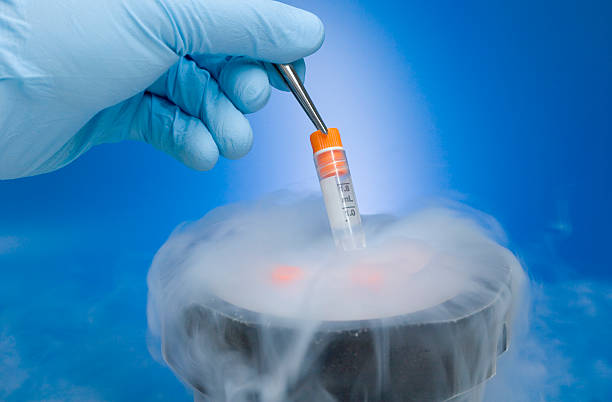
Egg Freezing Process Demystified
The egg freezing process is when the woman gets her eggs retrieved from the ovaries, which are then frozen and stored for future use. The technique is performed under anesthesia; thus, the egg freezing procedure is painless. Egg freezing in modern treatments is also known as oocyte cryopreservation. It is a safe procedure done by more than 30% of women, which is increasing day by day in India and globally as well. Freezing eggs has given women the freedom to preserve their fertility, and they can use those healthier eggs anytime in the future when the time feels right! Thus, as per many research papers, many women who are choosing egg freezing are in the 25 to 30 age group, which is a considerable egg freezing age limit.
While every woman has her own goals for freezing eggs, many are choosing egg freezing because of different factors; mostly it’s career goals, personal priorities, or medical issues like cancer can also be a reason for egg freezing. Cancer treatments such as chemotherapy and radiation often affect fertility. In such cases, women can still plan for future pregnancy through egg freezing; this is also known as oncofertility.
However, not every woman is a good candidate for the egg freezing procedure; their age, egg quality and quantity, underlying medical conditions, and lifestyle factors all affect the success rate of egg freezing. Before you choose to freeze your eggs, your gynecologist will ask you to give some tests, like: Ovarian Reserve Test & Hormonal Blood Tests. This helps them understand if the eggs will be healthy enough for future pregnancy, the right dosage of the treatment, and a customized treatment plan.
How does the egg freezing process work

The egg freezing process starts by making the eggs ready for retrieval; with regular monitoring, when the eggs are mature or ready, they are retrieved and stored.
Let’s look in detail at how the egg freezing procedure works:
Consultation:
This is the first step of the freezing process, where a few tests are done, like the AMH test, ultrasound, FSH, LH, estradiol, TSH, and infectious disease screening. After knowing the test results, the gynecologist plans dosages and a treatment plan. And then starts the egg-freezing process.
Ovarian Stimulation
For one week or two, you are given hormonal injections. This makes the ovaries mature multiple eggs instead of just one.
Monitoring
Again, for the next 1 to 2 weeks, you have to visit the hospital every other day for the monitoring of the eggs. Like, if the eggs are properly maturing or not.
Egg Retrieval
After weeks, when the eggs are safely matured, they are retrieved. This is carried out with a simple procedure. In this egg freezing procedure, you are numbed, and a needle is inserted through the vaginal wall into the ovaries to collect the fluid that is holding the eggs.
Freezing, also known as Vitrification & Storing
Here, the main goal is to freeze eggs only on the outer basis, not inside. At MediGrace IVF hospital in Nagpur, this process is done in liquid nitrogen, where eggs are frozen under –196°C in liquid nitrogen to avoid forming any ice crystals and pause their aging for years.
How long egg freezing process take?
The egg-freezing process completes in only 15 to 30 minutes, hardly any time at all. You will go get anesthesia, and then the eggs will be retrieved. There’s no huge task to do; thus, the egg-freezing procedure doesn’t take any time and can be done by any working woman. On the same day, you can return home, and the process takes only a few minutes to complete. The longest part of the process is just the egg stimulation, which goes for 10 to 12 days.
In the egg stimulation process, you don’t have to visit the hospital daily, but just twice or once a week. The ovarian stimulation injections are given by any nurse, which is done in just a few minutes. So, overall, on average, the entire egg freezing process from consultation to freezing takes around 2 to 3 weeks, while on egg retrieval day, it takes only 20 minutes.
Conclusion
The egg freezing process is simple and quick; it mostly completes in a few weeks and doesn’t take much time. It can be done by any woman who wishes to preserve their fertility for the future; just consult with the best gynecologist in Nagpur. The egg freezing age limit is a minimum of 25 years; at that age, anyone can get their eggs frozen. Success rates depend on factors like age, ovarian reserve, and lifestyle.
FAQs
What are the steps to freeze your eggs?
The egg freezing process is completed in 5-6 steps; it includes consultation, ovarian stimulation, monitoring, egg retrieval, vitrification, and storage of the eggs.
Is egg freezing a painful procedure?
No, egg freezing is not a painful procedure because you are kept under anesthesia during it. So you don’t feel any pain.
What is the correct age to freeze your eggs?
The correct age to freeze your eggs is a minimum of 25 and a maximum of 30 years. Between this age, you can freeze your eggs. You can also freeze your eggs after 35-40, but that depends on various factors.
What is the cost of egg freezing in India?
From ₹50,000 to over 1 lakh is the cost of egg freezing in India in many hospitals. At Medigrace IVF Hospital in Nagpur, various factors decide the cost of egg freezing.





